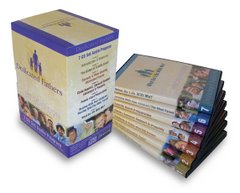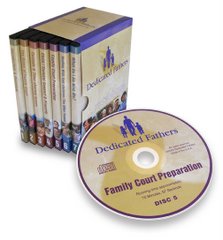
QUOTES AND SAYINGS FOR A MORE POSITIVE OUTLOOK
The following is a list of quotes and sayings that can and will positively effect your future. By changing your thinking you can change your life.
www.dedicatedfathers.org
• Not all who wander are lost.
• Success is getting up one more time than you fall down.
• Don’t trouble trouble, until trouble troubles you.
• “The best way to destroy an enemy is to make him you friend”--Abraham Lincoln
• If you plant a tree, don’t keep pulling it up by the roots to see how it’s growing.
• Adversity tempers the spirit.
• Doing the right thing requires courage.
• Your Choice: Victim or Victor.
• Surround yourself with the precious few who believe in you.
• Winning like losing, is a choice
• Belief in yourself far outweighs the doubts of others.
• Recipe for life–someone to love, something to do and something to look forward to.
• Live in harmony with your highest values and your innermost convictions. Never compromise.
• You must become the person you want to be on the inside before you see the appearance of this person on the outside.
• Develop a benevolent world view; look for the good in the people and circumstances around you.
• If you conduct yourself as though you expect to be successful and happy, you will seldom be disappointed.
• “Do what you can, with what you have, right where you are”--Theodore Roosevelt.
• Circumstances do not make the man; they merely reveal him to himself.
• It is when you finally learn that your fears are all in your mind that your life begins.
• Your outer world is a reflection of your inner world.
• Failure is merely another opportunity to more intelligently begin again.
• You are surrounded right now by unlimited opportunities disguised as insurmountable problems.
• “When a man begins to realize the truth about himself, it lessens his desire to reform his neighbors.”--Mark Twain
• Faith is to believe what we do not see, and the reward of the faith is to see what we believe.
Visualize success. Picture yourself succeeding. You will succeed.
Posted By: Dedicated Fathers
For more information and guidance on divorce and child custody please visit www.dedicatedfathers.org & www.unitedfathers.org
Thank you
Monday, March 19, 2007
QUOTES AND SAYINGS FOR A MORE POSITIVE OUTLOOK
Posted by
Dedicated Father
at
11:59 AM
48
comments
![]()
Labels: attorneys, child custody, children, counseling, divorce, divorce coach, fathers rights, legal, mediation, personal growth
Monday, March 5, 2007
Divorce Coach - Divorce coaching vs. Individual therapy
COLLABORATIVE DIVORCE COACHING
vs
INDIVIDUAL THERAPY
Marvin L. Chapman, MFT, CFC
Licensed Marriage and Family Therapist, MFC27081
Clinical Forensic Counselor, F16841
Certified Collaborative Divorce Coach
marvin@unitedfathers.org
www.unitedfathers.org
www.dedicatedfathers.org
Many people wonder what the difference is between a mental health professional
providing divorce coaching and a mental health professional providing
individual therapy.
Simply put: The major difference between divorce coaching and individual therapy
is the client, not the coaching or the therapeutic process.
Traditionally, individual therapy involves the assumption that the client is coming into therapy due to some real or perceived “problem” which they want to understand,
discover or have “treatment” thereon because their coping skills and/or current
manner of dealing with their “problem” is not working for them. Due to this
traditional thinking, it has long been a given that if someone is in therapy, something is “wrong” with them. Insurance companies and managed care facilities have
traditionally indicated a more comfortable position in dealing with emotional
“problems” from the medical model.
Simplified, the medical model says there is a disease (the problem), the symptoms
must be documented (a diagnoses from the DSM, yet another medical model),and a plan is laid out as to how the client will be “healed” (from the clinician’s
therapeutic orientation, paradigm or model). Based on this medical model, the
therapist will focus on the client’s history to assist in determining how the
“disease” (the problem) came about.
Many times you will hear therapists talk about the “pathology” of a client.
Ever wonder what “pathology” really means? (Definition: “The science or
Doctrine of diseases. That part of medicine which explains the nature of diseases,
their causes and their symptoms.” As you can see from the definition,
even in their diction, therapists use the medical model.)
With an understanding of the “pathology” the therapist can allegedly determine the
cause of the problem (the diagnosis). The therapist then gives the client new ways of
thinking, coping or behaving that allegedly will work better for them in the future
(the healing or curing of the problem). Under this simplified model, the therapist is the empowered helping agent; the client is the one with the “problem.”
Divorce coaching is different from individual therapy. In coaching, the client is not perceived as having any particular “problem” and the divorce coach does not
assume any “pathology.” Problems and/or pathological issues are only
dealt with if they impede the divorce process, wherein a suggestion may be
given that the client might benefit from therapy with an outside independent therapist.
In coaching, the therapist joins with the client in a duet of cooperation. The coach, having a therapeutic and mediation background, educates, offers insights and
observations, gives possibilities, and, at times, may even propose certain strategies
for the client to consider.
The divorce coach is specifically trained in the collaborative process to work closely with the client in their development of skills needed to deal with critical issues involving the divorce. Although coaching may be very therapeutic, it is not therapy.
The divorce process, whether adversarial or collaborative, is a complex and deeply
emotional process. Grief issues, such as denial, anger, bargaining and depression are usually involved, as well as a sense of loss and, many times, confusion.
Post relationship co-parenting issues are always a difficult area, as are support
and property issues. Individual parenting styles is also an area of concern for
many parents (How do I answer my kids’ questions? How do I or should I discipline
the kids who are already hurting?). Divorce coaches in the collaborative model
not only have specialized training of the collaborative process, they are also
generally very experienced in working with restructuring families.
As indicated above, the major difference between divorce coaching and
individual therapy is the client (not the coaching or therapeutic process).
In therapy, the client is perceived as having a “problem” with a particular
“pathology” for which the client is seeking help. In divorce coaching,
the client is not perceived as having any particular “problem”, and the
divorce coach does not assume any “pathology.” The divorce coach uses
their training and experience to assist their client through the collaborative divorce process in such a way that the client is able to move on with their life with the learned skills and knowledge needed to make their post divorce life as full and complete as possible.
BY: Marvin L. Chapman
www.unitedfathers.org
www.dedicatedfathers.org
Put Marvin's experience to work for you!
Order Dedicated Fathers Today!
Posted by
Dedicated Father
at
7:12 PM
32
comments
![]()
Labels: child custody, child support, collaborative divorce, court case, dads, divorce, divorce coach, divorce mediation, divorced dads, family court, fathers rights, law, legal, mediation
Tuesday, February 27, 2007
Mr. Marvin L. Chapman - Dedicated Fathers

Mr. Marvin L. Chapman
Author/Creator of Dedicated Fathers
President of United Fathers of America
Licensed Marriage and Family Therapist (MFC27081)
Clinical Forensic Couselor (F16841)
Certified Collaborative Divorce Coach
www.unitedfathers.org
www.dedicatedfathers.org
Mr. Marvin L. Chapman has over 25 years of experience both inside and outside of the family court system. He has been involved in thousands of cases and has developed a working professional relationship with the courts, facilitator's offices, Legal Aid Society, Department of Social Services, Department of Child Support Services, private attorneys, forensic professionals, private therapists, and many others. This lifetime of knowledge and experience is what Marvin draws upon when assisting parents who are going through the family court process. It is Marvin's passion and his joy to share his knowledge and experience with others.
Marvin Chapman's full professional resume and biography can be viewed by clicking on the following link:
Marvin's Bio
www.dedicatedfathers.org
Posted by
Dedicated Father
at
2:34 PM
3
comments
![]()
Labels: child custody, child support, divorce, divorce coach, divorce mediation, family court system, fathers rights, legal, mediation, survive divorce
Monday, February 26, 2007
divorce mediation part 5 - recommendation
DIVORCE MEDIATION
Part 5
Recommendation Mediation
BY: Marvin Chapman & Dedicated Fathers
www.dedicatedfathers.org
www.unitedfathers.org
Court Connected Mandatory Mediation - Recommendation Mediation
If your County Mediation office IS NOT confidential, meaning they do make a recommendation to the court, then listen closely...
Be very careful. Everything you say, every thing you do (or do not do), every action, every reaction, every statement or lack of statement, can and will be used against you by the mediator in their recommendation to the court.
Why? Because mediators are people with similar biases, prejudices, preconceived notions, belief in stereotypes and other dysfunctions - just like normal people. It is extremely unfortunate confidentiality is not mandated because in recommendation mediation, any and all of any particular mediators’ biases, prejudices, stereotypes and preconceived notions will have an effect on their “recommendation” to the court - a recommendation which the court will almost always follow.
If mediation is not confidential then you will need to dress, walk, talk and act as if you are in front of the judge. You will want to present your reasons and explanations for what you are asking without making disparaging remarks about the other parent and without the need to justify your reasons. This is a time to show how you can stay out of the garbage pit of emotions, time to show you can stay focused on the best interests of your children, and time to demonstrate how you plan on making your parenting plan work for all concerned.
Remember, if mediation is not confidential, then everything - and I mean everything -can be and will be subjectively evaluated by the mediator. The mediator’s subjective evaluation, including all of their biases, prejudices, preconceived notions and stereotype beliefs, will impact their recommendation to the court.
This is the time and place to demonstrate your friendliness, the openness from which you are willing to deal in mediation, and your pleasant personality in getting along with the other parent, all of which will go a long way towards warming the mediator to your way of thinking.
BY: Marvin Chapman
www.dedicatedfathers.org
Start defending your rights today with the Dedicated Fathers Audio Series!
Posted by
Dedicated Father
at
10:39 AM
11
comments
![]()
Labels: child custody, child support, court case, divorce, divorce mediation, family court, family court system, fathers rights, law, legal, mediation
Thursday, February 15, 2007
divorce mediation (part 4) - confidential mediation
DIVORCE MEDIATION (PART 4)
Court Connected Mandatory Mediation - Confidential Mediation
Part 4 of an ongoing article on Divorce Mediation
By: Marvin Chapman & Dedicated Fathers
www.dedicatedfathers.org
More divorce related info
In California, if child custody or visitation are being contested, both parents must attend court connected mandatory divorce mediation. However, not all of the counties follow the requirement of confidential mediation. You will want to check with your local family court mediation department as to whether or not they follow the requirements of confidential mediation.
There may be no court connected mandatory mediation process in your state. To find out about your state requirements, check with your local family court personnel.
If you reside in California, or If your state has court connected mandatory mediation, you will want to discover whether such divorce mediation is confidential or recommendation based. If your mediation is confidential mediation, then feel free to express yourself fully to the mediator as to what you believe is in your children’s best interests.
In mediation, as in life, treat the other parent as you would want to be treated. Mediation will generally work out better for you if you do not use the process to try to heal your hurts and pains of the break up of your relationship.
You will want to take to your mediation appointment a written parenting plan outlining exactly what you believe is the best parenting plan for your children. Remember, this is mediation, not court. However, just like in court, you will seldom get everything you want from mediation. I typically tell my clients if you get 80% or better of what you are asking for, take it - it will probably be better than rolling the dice with the judge.
On the other hand, if you are getting less than 80%, then you are probably better off taking your issues to the judge. This suggestion is based solely on my experience with United Fathers of America for over 25 years, and my experience as a mediator in the Los Angeles County Mediation and Conciliation Courts.
BY: Marvin Chapman
Put Marvin Chapman’s knowledge and experience to work for you!
www.dedicatedfathers.org
Order the Dedicated Fathers Audio Series Today!
(continued)
Posted by
Dedicated Father
at
1:12 PM
1 comments
![]()
Labels: child custody, children, divorce, family court, fathers rights, law, legal, mediation
Saturday, February 10, 2007
divorce mediation part 3 - court connected
DIVORCE MEDIATION (PART 3)
Court Connected Mandatory Mediation
Part 3 of an ongoing article on Divorce Mediation
By: Marvin Chapman & Dedicated Fathers
www.dedicatedfathers.org
www.unitedfathers.org
Many states now have court connected mandatory divorce mediation (sometimes referred to as conciliation or conciliation court - meaning an agreement under friendly terms). Court mandated divorce mediation is a non-adversarial process where a neutral third party meets with the disputing parents to assist them in settling their issues and coming to an agreement.
Court mediator’s are mental health professionals who typically have at least a Masters Degree, with extensive experience in the field of marriage, family and child counseling and/or social work. Mediators are specifically trained in conflict resolution skills and the process of mediation. Court mandated divorce mediators are court employees not paid by either party. They assist the parents in focusing on the best interests of their children, to deal with the present situation and developing plans to deal with that situation.
One of the main ideas of mandatory mediation is to help the parents see the positive issues each parent comes up with, without blaming or shaming the other parent. Although the needs of the children come first, mediation is also sensitive to the needs of both parents.
The primary purpose of mandatory court connected mediation is to allow the parents the time and opportunity to develop their own agreements before direct court intervention is necessary. This process frees up the court’s time, which is already at a premium.
Although mandated to go to divorce mediation, the parties are not mandated to actually mediate and certainly are not mandated to come to any agreements - unless they want to.
Mandatory court connected mediation is NOT marriage counseling or reconciliation counseling designed to get the parents back together.
My background is in just such a mediation setting. In the early 80's I was a court mediator in the downtown Los Angeles Conciliation Court. Based on that experience, I offer the following to you:
In mediation, as in all areas of your life, act, do not react, to the situation. Personal attacks and character assassinations are neither warranted nor productive. You are in mediation to talk about the needs and your interpretation of the best interests of your children, which will include your desires as to a parenting plan and child custody. You are NOT there to “settle the score” with the other parent.
If you sense you are being verbally chastised or abused during the divorce mediation process, it is up to you to ensure such actions are stopped. Reacting to that type of behavior will only escalate the behavior and serve to sabotage any meaningful mediation or negotiation. If the verbal abuse or chastisement continues, excuse yourself and leave the mediation room. Thank the mediator for their time and explain to them that you are not there to settle old relationship issues and that you personally have no need to sit there and take verbal abuse, accusations, threats or derogatory comments.
You have the inalienable right (a right which may not be taken away or transferred to another person) to personal boundaries of behavior which are acceptable to you and you do not give up those rights just because you are in Court Connected Mandatory Mediation.
There are two types of Court Connected Mandatory Mediation. Some court’s allow for totally confidential mediation wherein if the party’s do not make an agreement, all that happened in the mediation process is kept confidential and away from the court. Other court’s allow for a recommendation mediation policy wherein at the conclusion of the mediation process, the mediator makes a recommendation to the court as to what the mediator sees as being the best solution for the family. In future articles I will explain the basic differences between confidential mediation and recommendation mediation.
(continued)
BY: Marvin Chapman
Visit us at www.dedicatedfathers.org
Order your copy of Dedicated Fathers Today!
Posted by
Dedicated Father
at
4:25 PM
2
comments
![]()
Labels: child custody, child support, collaborative divorce, counseling, divorce, family court, fathers rights, law, legal, mediation
Tuesday, February 6, 2007
Divorce Mediation part 2
DIVORCE MEDIATION (Part 2)
Voluntary Mediation
Part 2 of an ongoing article on Divorce Mediation
By: Marvin Chapman & Dedicated Fathers
www.dedicatedfathers.org
www.unitedfathers.org
Voluntary divorce mediation is a process in which a skilled intermediary helps couples arrive at a mutually satisfactory and amicable agreement without judicial interference through effective communication, exploration of viable options and alternatives, negotiations and compromise. It is a problem solving process in which parents are encouraged to be open and direct in their conversation styles to lessen the chance of misunderstandings and distortions.
The divorce mediation process facilitates a change in parental interactions from the competitive and destructive win-lose mentality of the adversarial system, to a more cooperative problem-solving process. Underlining the success of the mediation process is a set of beliefs:
The belief that there is a mutually acceptable solution to every situation;
The belief that both parents desire a mutually acceptable solution;
The belief that cooperation instead of confrontation will produce mutually acceptable solutions;
The belief that both parents are valuable and have insights and notions which are worthy to be heard and considered; and
The belief that some solutions will need to transcend both parents special interests and concerns because those solutions are better for the restructuring family as a whole.
A divorce mediator sees the family as being in a restructuring process, where all parties are going through a reorganizing life event and simply need assistance in coming up with their own solutions. Not surprisingly, research has found that parents are much more likely to follow their own mediate settlement plan than parents who try to settle their differences through the adversarial system.
Mediation allows for the shift of attention from past relationship issues to current and future custodial and parenting plan issues. It provides parents the opportunity to resolve their issues among themselves without the adversarial process tearing them apart emotionally and financially.
The mediation process typically has five (5) phases which follow below:
First Phase: Initially there are the obligatory introductions and a basic orientation to the mediation process and procedures, the setting of ground rules and the outlining of initial joint goals. During this First Phase the nonthreatening environment boundaries are established. It is during this First Phase that the divorce mediator joins with both parents and establishes trust with each of them.
Second Phase: During this phrase the parties start sharing relevant information about their specific issues. This disclosure process allows the mediator to understand the family dynamics and the level of family functioning. During this stage, the wants, needs, desires and goals of both parents are presented and some explanations allowed as to why those issues are so important to that parent.
Third Phase: This is where the real work (the art of mediation as I call it) truly begins. During this phase the parties start working through issues, practice active listening, learn to compromise, and learn to negotiate without losing their personal power.
Fourth Phase: During this phase, the initial agreements are drafted into tentative agreements for both parents to visually see what their agreements look like on paper in legalese (court language). These initial agreements are then discussed and defined further.
Fifth Phase: During this final phase the divorce agreement is reviewed and approved by the respective attorneys, refined and modified as needed and then finalized by the parents.
Mediation will work for motivated parents. Parents who do not want a third disinterested party (the judge) to make decisions about their lives and the lives of their children. However, it also takes a fairly mature parent to actually come to an agreement. Putting aside hurt feelings and the desire to get even, not attempting to pay back the other parent for their perceived wrongs, and other such feelings and notions must be put on the back burner for mediation to work. For those who can make mediation work, it is far better than allowing a disinterested and totally uninvolved judge from making so many serious decisions about your family and your restructuring process.
Divorce mediation will typically save you a lot of money in attorney fees and time off work for court appearances (many mediating sessions are done in the evenings, after normal working hours). It will also save on the emotional and other stressors that typically go along with the adversarial process.
Mediation is part education. In many cases you and the ex will learn new ways of communicating and new ways to work out problem areas - ways which will assist you is settling future disputes without the need for the adversarial court process. As stated earlier, studies have also shown that mediated agreements are more likely to be followed by both parents and therefore less disruptions for the children, now and into the future.
Mediation is generally accepted as being successful to the extent it results in a voluntary settlement which is accepted as equitable by both parties, their attorneys and the mediator.
By: Marvin Chapman
www.dedicatedfathers.org
Set your self up for success!
Order Dedicated Fathers Today!
Posted by
Dedicated Father
at
12:42 PM
1 comments
![]()
Labels: child custody, children, collaborative divorce, court case, divorce, family court, fathers rights, legal, mediation
Tuesday, January 30, 2007
Divorce Mediation

MEDIATION
Part 1 of an ongoing article on Divorce Mediation
By: Marvin Chapman & Dedicated Fathers
http://www.dedicatedfathers.org
There are basically two (2) types of divorce mediation:
Voluntary Mediation and Court Connected Mandatory Mediation.
An overview and general outline of both types of mediation are presented below.
Voluntary Mediation
Generally, at any time you and the other parent have the right to enter into voluntary divorce mediation. Voluntary mediation is where you voluntarily (without any mandates from the court or any other source) take your family court issues to an independent third (3rd) party who is has been specifically trained in the art of mediation and negotiation. The primary function of an independent divorce mediator is to assist you and the other parent in coming to compromised agreements, which are then prepared into court approved documents, which then become court orders.
Court Connected Mandatory Mediation
The second type of mediation is court connected mandatory mediation. This mediation is set up by the family courts and you are mandated by the court to attend. Mediators in court connected mandatory mediation offices are generally professional divorce mediators hired by the court to help parents come up with their own agreements, typically dealing only with custody and visitation issues. There are generally two (2) types of court connected mandatory mediation –
Confidential mediation and Recommendation mediation.
Confidential Mediation
Confidential Mediation is where all that is said and done within the mediation session is kept confidential. There court will never hear what was specifically said or done within the mediation sessions.
Recommendation Mediation
Unlike confidential mediation, in recommendation mediation the divorce mediators actually make custody and visitation recommendations directly to the court. Everything that was said and all behaviors exhibited during the mediation sessions are open for the mediator to interpret, judge and comment upon in open court.
Personal Note: I find it very hard to believe divorce mediators within the recommendation mediation model have the audacity to believe they can learn the dynamics of a particular family and become so familiar with the functioning of that family to the degree they are able to ethically make an intelligent recommendation about what is best for that family. I personally believe this is one of clearest forms of abuse which families are subjected to within the adversarial family court system.
www.dedicatedfathers.org
Get Educated about your rights Now!
Order the Dedicated Fathers Audio Series Today!
Posted by
Dedicated Father
at
4:20 PM
9
comments
![]()
Labels: child custody, child support, divorce, family court, fathers rights, law, mediation, survive divorce
Friday, December 29, 2006
To Hire or not To Hire an Attorney (Part 1)
TO HIRE OR NOT TO HIRE AN ATTORNEY
Part One of Two Parts
www.dedicatedfathers.org
Click here for more related stories
It has been said that a person who represents themselves has a fool for a client. If this is true, is it also true that a person who hires an attorney has fool in charge of their life?
In other words, you’re damned if you do and damned if you don’t. Therefore, you need to know when, why and how to hire an attorney.
In California, if you appear in court and represent yourself it is called going In Pro Per, which literally means “In one’s own proper person.” Some states call representing yourself Pro Se, which literally means “For one’s own behalf, in person.” No matter what your state may call it, it means you are representing yourself in court. Many people have handled their own family court case, with just a little help in doing the required legal paperwork.
If it appears your case will be routine or normal (meaning no known or expected surprises), and if there does not appear to be a lot of areas of serious disagreement between you and the other side, and if you are comfortable speaking in front of people, then a paralegal or support group can help you save a lot of money by assisting you in representing yourself.
Question?
What kind of people represent themselves?
Answer:
Most people represent themselves because they outright cannot afford an attorney. Some people represent themselves because they have been represented by an attorneys in the past and they now believe they can represent their own interests as well, if not better, than their previous attorneys. And there are those who represent themselves because they feel that even if they lose, they will have won by not having to pay the high costs of an attorney (some people believe just the fact of not paying an attorney is a “win”).
Reality is that many cases require an attorney. An example of a case requiring an attorney would be a case where there is a major confrontation over issues of custody and visitation and/or where there are serious differences over distribution of the community property. These kind of cases mandate an attorney and it would be prudent for you to retain the best attorney you can afford (of course there are those cases wherein you absolutely can not get the money together to hire an attorney. In those cases it is obviously better to represent yourself as best you can, rather than allow a default to be entered against you. In these situations, representing yourself will at least let you know for the rest of your life that you did all you could do).
However, whether or not you hire an attorney, it remains your responsibility to keep your case organized, to keep yourself updated on all happenings in your case, and to continually stay informed as to all facts
The following two sections are presented solely to assist you in determining whether or not you will want to attempt to represent yourself and, if you choose to involve an attorney, some guidelines to assist you in determining which attorney is best for you. You may want to check your state and local rules, regulations and procedures to discover whether the following notions are valid in your particular area.
If Going Pro Per / Pro Se (Representing Yourself)
1. If you can, get hooked up with a good nonprofit organization. The information and education about the local court system will be invaluable to you.
2. Visit the local family courthouse and observe the procedures in the courtroom. Divorce hearings are open to the public and you are allowed to go in and watch. Paternity actions are usually considered quasi-confidential hearings and therefore you probably would not be allowed to stay. However, the process and procedures are basically the same for both, so if you have a paternity action you can gain the information needed by observing a divorce hearing. While in the courtroom, take notes, study what is happening and why, check out how the judge reacts to certain questions or answers and observe communication styles of the different participants. If questions as to why you are there - tell them the truth, you have a hearing coming up and you wanted to see in advance what it was all about.
3. After the courtroom visit, meet with your advisor or coach to go over any questions which arose from your observation of the divorce proceedings.
4. No matter what happens during the process of representing yourself, never react to the situation. Take a moment to assess what is happening and then act upon it - never ever react. It is almost always fatal for us as males to react instead of proactively acting upon.
5. You and your case will survive the experience in much better shape if you stay out of the gutter, no mud slinging and no disparaging remarks - no matter what.
6. Your future lies in how strong and bold you are able to present your facts to the court, not in how well you react to the allegations from the other parent. Stay in your strength and power, be confident, self-assured and positive. Then, and only then, will you be able to walk away from this experience with your self-respect, self-worth and dignity still intact.
(continued)
BY: Marvin Chapman
www.dedicatedfathers.org
http://www.dedicatedfathers.org
Posted by
Dedicated Father
at
11:09 AM
0
comments
![]()
Labels: child custody, collaborative divorce, divorce, family court, law, legal, mediation
Monday, December 11, 2006
Preparation for your divorce and/or child custody case
Preparation for your divorce and/or child custody case
Prior to Court
www.dedicatedfathers.org
Prior to your court hearing, you need to go to the courthouse and watch how other divorce and child custody cases are conducted. If possible, go to the exact courtroom in which your case will be heard and see how the judge handles their courtroom. Watch the courtroom process and become familiar with how things are done.
Even though you were in the courtroom observing the proceedings a day or two before, on the day of your hearing make sure you tell the court clerk or bailiff your name and make sure you are in the correct courtroom.
You can never be too prepared for a divorce or child custody court hearing. Therefore, before each court appearance, review, review, review and review some more. You need to know your court documents for that hearing inside and out.
On the Court Day
Dress appropriately and comfortably. A coat and tie are not necessarily required, but slacks and a dress shirt are the minimums. You want to look good, look professional, look respectful, without looking like a million dollars.
Never, ever be late for a divorce or child custody court hearing.
Unless requested otherwise by court personnel, do not take your children to court.
Watch your behavior from the moment you get out of your car until the time you drive away from the courthouse. You never know who is watching, what they are watching and who they may be talking to - stay alert.
Do not chew gum or candy while in the courtroom.
Once in the courtroom, do not leave unless your attorney gives you the OK. Not leaving the courtroom is especially important if you are representing yourself because if they call your case and you are in the restroom, they may count you as a “non-appearance” and take your case “off calendar.”
Stand up when the judge enters the courtroom and wait until he/she sits down before you do. Making eye contact with the judge during the proceedings is OK, but do not stare. The judge is the authority of the courtroom, they make the rules (and they can change the rules without every saying a word about it, so be flexible, be prepared and be confident).
Take a pad of paper with you to your divorce or child custody court hearing so you can write down any important information such as, dates and times of continuances, temporary orders, or special instructions from the judge.
Keep your focus purposeful and directed. Do not allow yourself to become disappointed or drained by the legal process. Family court procedures can be very stressful with frustrating delays, confusing rules and unfair tactics by some attorneys. Shake off the negatives, hold on to a positive thought and keep your energy level up - this is your life, this is your child’s life, and this is you and your child’s future at stake.
Listen to what is being said and mark down on a piece of paper any lies, discrepancies or omissions in the other parent’s testimony including any of the other parent’s witnesses’ testimony. If you have an attorney, do not whisper to your attorney; instead, pass along the notes you have been writing (unless otherwise instructed by your attorney).
When testifying in your divorce or child custody hearing, make the assumption the judge has not read any of your file, none of your current paperwork, and therefore knows absolutely nothing about your case.
Be confident, not cocky; Be assertive, not aggressive. Give an impression of confidence in yourself and your abilities as a parent.
Anytime the judge speaks to you, respond in a pleasant and polite manner.
Do not whisper or talk while the judge is talking. Never, ever make faces, gestures or remarks in response to what was said by the other parent, their attorney, a witness, or the judge. Have your best happy and confident poker face firmly planted.
Obviously, never lose your temper in front of the judge - no matter what happens, no matter what is said, no matter was is done. Stay calm, in control and confident even under extreme stress and duress. Do not get into arguments or make unseemly remarks to anyone in the court or in the halls or any surrounding area before, during or after the hearing or any breaks during the hearing.
When questioned by the judge or attorneys, keep your answers short and to the point. Never volunteer any information whatsoever. If you have an attorney, always look to your attorney before answering any questions - allowing your attorney time to object to the questioning if they need to.
In California, you will want to take a self-addressed-stamped-envelope (SASE) to give to the court clerk to mail you a copy of the Minute Order from your divorce or child custody hearing. This will save you a trip back to the courthouse later to pick up your Minute Order.
www.dedicatedfathers.org
By: Marvin Chapman
www.unitedfathers.org
Posted by
Dedicated Father
at
1:03 PM
246
comments
![]()
Labels: attorneys, case, child custody, child support, collaborative divorce, court case, divorce, family court, family court system, law, legal, mediation
Tuesday, December 5, 2006
Mediation & Collaborative approach as compared to the Adversarial Divorce approach
Mediation and Collaborative Approaches as Compared to the Adversarial Approach
www.dedicatedfathers.org
In the adversarial approach, the definition of the issues is primarily determined by the attorneys. In mediation and collaborative approaches, the issues are defined by the parents. In the adversarial approach, the legal framework for the action is John vs Jane, the emphasis is on the individual. In the mediation and collaborative approaches, the legal framework for the action is John and Jane, the emphasis is on the couple and their reorganizing and restructuring family.
In the adversarial approach, the parents relationship is focused on past issues, blaming, shaming, mistrust and revenge. In mediation and collaborative approaches, the parents relationship is focused on restructuring family issues, reorganizing styles of communication, and cooperation. The parents relationship creates conflicts with their children, loyalties are divided and rewards are received for alienating the children against the other parent - creating adjustment problems for the children. In the mediation and collaborative approaches, the parents relationship focuses on preserving both parents’ relationships with their children.
In the adversarial approach, the court decides the parenting plan (regardless of the fact the judge has no idea what is best for this family). In the mediation and collaborative approaches, the parents decide the best parenting plan for them and their restructuring family. In the adversarial approach, the expense to the parents can be and typically is enormous. In the mediation and collaborative approaches, the expense is less, and many time times much less - thereby allowing the restructuring family to keep control over more of their assets.
In the adversarial approach, the time to conclusion can be extensive (after all, more time means more money for the attorneys). In the mediation and collaborative approaches, the time to conclusion is almost totally controlled by the parents. There is usually no confidentiality and the issues are open for public exposure. In the mediation and collaborative approaches, there is total confidentiality and the issues are not open for public exposure.
In the adversarial approach, the goal and desired outcome is to win at all costs, giving in as little as possible to gain as much as possible from the judge. In the mediation and collaborative approaches, the goal and desired outcome is to come to a fair, reasonable, equitable and mutually acceptable agreement as determined by the restructuring family.
With the adversarial approach, adherence to the terms of the court order is far from certain and typically will create the atmosphere of even more mistrust, which results in even more court hearings in the future. In the mediation and collaborative approaches, adherence to the terms of the agreement are far more likely since the terms of the agreement were negotiated and agreed upon by the parents themselves, therefore lessening the chances of returning for additional court hearings in the future.
By: Marvin Chapman
www.unitedfathers.org
Visit www.dedicatedfathers.org today!
Posted by
Dedicated Father
at
3:37 PM
0
comments
![]()
Labels: adversarial family court system, attorneys, child support, collaborative divorce, divorce, law, legal, mediation, survive divorce
Wednesday, November 29, 2006
Dedicated Fathers, child custody, and Divorce
Dear Friend,
Since you are reading this, chances are, you, a close friend, or maybe even a family member are involved in the family court process, child custody battle, or engaged in a divorce. I want to assure you first and foremost...you are not alone.
Odds are you have been thrown into a world you do not understand. I have been where you are and I do understand. As someone who went through an emotional divorce process and child custody battle over 25 years ago, I understand just how confusing, frustrating and uncertain your divorce will be. For me, it was the hardest time of my life. I was frustrated, hurt, confused, and very anxious. I had no idea where to begin,and I had no idea what I was up against. I felt lost and alone.
Then, I met Mr. Rod Bivings, a father who started the childrens rights organization “United Fathers of America.” Rod too had been a Dedicated Father - a daddy who had been relegated to a visiting figure in his own kids’ lives. As he called it, he was “visiting uncle” to his kids, no longer viewed as a daddy even to his own children.
Rod gave me the education and information I needed to understand child custody issues and my fathers rights. He demystified the family court process and prepared me to confront my child custody issues, and my divorce. But more importantly, Rod helped me understand I was no longer alone, just as I am here now letting you know…you are not alone.
Having said all of that, I decided to dedicate the rest of my life to not only helping other parents organize their cases, but also helping them stay involved in all aspects of their children’s lives. As you read about Dedicated Fathers, let me reassure you again, YOU ARE NOT ALONE - there are thousands of other Dedicated Fathers out there just like you - just as anxious, just as scared about their futures, and just as confused by a system that constantly appears to be working against them.
With over 25 years of experience in the trenches, I have assisted tens of thousands of dedicated parents navigate through the maze of the family court system. Over eighty-percent (80%) of all family court litigants represent themselves. The Dedicated Fathers audio book series is a low cost alternative to high priced attorneys. There is no other self-help source in the marketplace that encompasses, not only the family court system, but also equally important, the emotional needs of both parents and children during the family restructuring process.
What kind of people represent themselves in Family Court?
Most people represent themselves because they can’t afford an attorney. Some people
represent themselves because they have been represented by attorneys in the past
and believe they can represent their own interests. The reality is many cases do
require an attorney. Use your best judgment and some guidelines to determine the
best course for your case. Remember….whether you hire an attorney or not, it is your
responsibility to keep your case organized and to keep yourself up to date.
The Dedicated Fathers Audio CD Series will teach you about how the Family Court system is designed to exaggerate and exacerbate any difficult situation between you and the other parent. How it REQUIRES both parents to tear the other apart. How it can take on a life of its own, and how it totally destroys family values - yet sustains itself because it is a multi-billion dollar business. You heard me right, family law is a multi-billion dollar industry in America.
The Dedicated Fathers Audio CD Series will show you that information is power, and that you will need all the power you can get. It will give you the education and information you need to make the right decisions for your situation, it will place you in a more powerful position when confronting the adversarial family court system. You will clearly see that YOU ARE NOT ALONE.
A family law specialist attorney will cost you $300 per hour or perhaps, even more. I know this audio program and workbook will save you far more than just one (1) hour of time with your attorney. In fact, this program will pay for itself and help you choose the right attorney, which in itself will probably save you not only money, but time, energy and frustration as well.
Think about it, for less than the cost of one hour with a family law specialist, you can have the education and information constantly at your fingertips to empower you to take charge of you and your children’s future. Presenting yourself, your family information, and your case history in an organized and easy to understand manner to your attorney and to the court is YOUR RESPONSIBILITY. Why pay an attorney thousands of dollars to extract information from you about your case? Why not have a detailed case history ready to present to your attorney? This audio series will inform you on everything from how to dress in court, to what to do if your spouse is making false statements about you.
I have assisted thousands of families over the years and it has been my passion to share my experiences, my knowledge, and the information that I know will help you and your case. I know this series will help you better understand the family court system and guide you through the maze of the family court process.
You now have an idea of what you are facing, which leads us back to purpose of
The Dedicated Fathers Audio Book Series: To give you education and information based on my over 25 years of experience of working both inside and outside of the adversarial family court system.
Education and Information are necessary companions when going to battle within the Family Court system. Education about the family court process is the first step in regaining control of our lives and taking charge of our futures. Information about the family court system is essential to being successful, just as information about our jobs is essential to being successful at work.
Education - Education about the family court process to help you to regain control over your life and to assist you in taking charge of your future and your children’s future with you.
Information - Information about the family court system which will assist you, in being successful in your attempts for justice, fairness and equitable treatment within the family court system.
As a therapist, I can tell you research has shown that the death of an immediate family member is the number one most stressful event in a persons life.
Believe it or not, the second most stressful event in a persons life is involvement in the adversarial family court process.
And the third most stressful event in a persons life is a radical change of employment.
Let me give you an example:
I had a client whom I will call Bill. Bill came to me after being served divorce papers from his wife. They had 2 small children, about 5 and 7 years old. Regardless of the relationship between Bill and his wife, Bill had always been a very dedicated father. The divorce papers included an order that Bill was to leave the family home by 7:00 PM that night, and that he could not return to the family home. Therefore, within 24 hours, Bill went from being a husband and a father, to being kicked out of his house, and out of his children’s lives. Bill then had to take time off of work due to meetings with his attorney, court appearances, depositions, and other family court requirements. He missed so much work that his employer eventually fired him.
Now Bill was not only hit with the family court process, the 2nd most stressful time in a persons life, he was also hit with a radical change of employment, the 3rd most stressful time in a persons life. In less than a 4 month period of time, Bill was now confronting 2 of the top 3 life stressors a person will face. Through the months of the family court process, Bill was eventually allowed visitation with his children. Child support and all of the other issues were eventually settled; HOWEVER, by the time it was over - Bill was no longer the same person. He had gone from a 24 / 7 husband, father, provider and protector - to an unemployed, deeply hurt, angry and frustrated man.
Like Bill, your involvement in the adversarial family court system will include a roller-coaster ride of emotions (some of which you may have never experienced before), in addition there will be financial constraints and stresses, there will be the strain of trying to balancing your home, your work, and your need to be an active participant in your family court case.
Involvement in the adversarial family court system not only includes the confusing and mystical legal processes and procedures, it involves an entire system which is built and sustained on making your relationship with the other parent worse, not better. This will not be an easy time. When you come out of the family court process, you will clearly understand why your involvement in a divorce and child custody case are the second most stressful event you will ever experience.
In all of my experience I have found it is imperative that fathers stay true to themselves, never compromising their integrity or moral values which are sometimes lost while navigating the family court system. The Family Court System doesn’t care about you...and neither does your attorney...what they do care about is getting as much money out of you as possible.
Many of the anxious and confused feelings we experience are caused by a family court system that does not operate by any rules which we have previously experienced. The family court system is a world unto its own, with its own rules and procedures. The most difficult facet of this new world is that the judge in family court is given wide discretionary powers unlike any other judge in any other area of law. In family court, there is nothing to stop the biases, prejudices, and personal beliefs of the judge from influencing their decisions.
Remember Bill, who we talked about earlier who had gone from a 24/7 husband, father, provider and protector - to an unemployed, deeply hurt, angry and frustrated man? Bill had come into my office after being totally devastated by the system. We worked on rehabilitating his image and his case for court. We did some case management and case history organization. We then outlined a game plan and took our plan to an attorney.
I also counseled with Bill to help turn his thinking around. Armed with information and education, Bill’s thinking went from victim or reactive, to confident and pro-active. With this new way of thinking and a more positive attitude, Bill was able to find a new better paying job. Bill was one of the lucky ones. Lucky because he gained the information and education he needed to put himself in a more powerful position, both with his family court case, and with his new employment.
Bill had endured. He had not given up. He discovered he was not alone.
Like Bill…………you are no longer alone.
A Dedicated Father
www.dedicatedfathers.org
www.unitedfathers.org
Posted by
Dedicated Father
at
4:52 PM
3
comments
![]()
Labels: child custody, child support, children, divorce, family court, fathers rights, guidance, help, law, legal, mediation, support, survive divorce, visitation




















